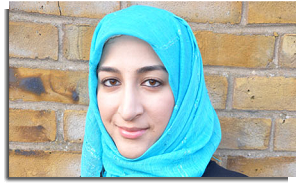Region: UK & Worldwide
“Britain is at the forefront of Europe in its flourishing diversity and this is an opportunity for the multiple British communities to come together in dialogue and harmony.” – Remona Aly

The last decade has been nothing less than challenging for Muslims in Britain. In the aftermath of the horrific attacks of 9/11 in New York and 7/7 in London, followers of the second largest faith group in the world were sharply thrust under the media spotlight. The situation seemed bleak, yet a glimmer of hope survived the storm. The focus for Muslim communities in the UK was on healing, building and engaging, more than ever before, as local community and grassroots projects sprung up across the nation.
Nine years after the US attacks, and five years after the London bombings, has the situation improved for British Muslims?
It’s difficult to answer with any precision, but the YouGov poll undertaken at the end of May 2010 revealed that one in two Britons associate Islam with extremism and terrorism. Only six per cent believe it encourages justice. Sixty-seven per cent were of the opinion that Islam encourages the repression of women, and 41 per cent “disagreed” or “strongly disagreed” with the idea that Muslims have a positive impact on British society.
The poll was commissioned by the new charity, Exploring Islam Foundation (EIF), which was founded by a group of young British Muslim professionals deeply concerned about the public perception of their faith. Aiming to challenge misconceptions about Islam, and raise awareness about its universal values and contributions, the foundation seeks to build upon the excellent local efforts of various Muslims and Islamic organisations. It felt it was time to mainstream Islam in the public eye.
was time to mainstream Islam in the public eye.
EIF launched its first media campaign, “Inspired by Muhammad”, in June 2010. The daring public relations initiative primarily featured an ad campaign covering three issues championed by the Prophet Muhammad: women’s rights, social justice and protecting the environment. Images of Muslims linked to each value were placed around London transport: on the underground transit system, at bus stops and on a fleet of the capital city’s iconic taxis.
“Inspired by Muhammad” sparked off an overwhelming amount of interest both nationally and globally. It was reported on in hundreds of media outlets from the Middle East to Mexico, from New York to New Zealand, reaching millions upon millions of people. The website received 200,000 hits in the first fortnight after going live, with visitors from over 160 countries. It was discussed in blogs, tweets and social networking sites.
Emails poured in from Muslims pronouncing their pride in a campaign that finally represented Islam’s true values. “Inspired by Muhammad” was an enterprise that articulated the growing confidence as part of the British Muslim identity.
The mainstream media response was incredibly positive, with the campaign even contributing to programme content, such as BBC’s The Big Questions, which asked, “Does Islam need better PR?” This show’s participants, including poet Benjamin Zephaniah and the New Statesmen’s Senior Editor Mehdi Hasan, praised the campaign as a shining example of public relations for Islam. On the individual level, while there were numerous blogs that relished the occasion for expressing anti-Muslim sentiment, there were also many who wished EIF well: “I am a non-Muslim,” one man emailed, “and I am very inspired by your work.”
 Though the YouGov poll findings were disheartening, it is ever more incumbent on us as Muslims living in Britain to be proactive rather than reactive, to show conviction rather than victimisation, and to continue making our valuable contributions towards progressing British society.
Though the YouGov poll findings were disheartening, it is ever more incumbent on us as Muslims living in Britain to be proactive rather than reactive, to show conviction rather than victimisation, and to continue making our valuable contributions towards progressing British society.
After the positive response to its inaugural campaign, EIF looks forward to the next, which will launch in January 2011, focusing on a history of coexistence and compassion between Muslims and Jews; a significant and sensitive relationship whose long history of convivencia has been largely overshadowed by geo-politics.
EIF’s second campaign, “Missing Pages”, will voice solidarity with Holocaust Memorial Day on 27 January and demonstrate how anti-Semitism goes against the teachings of Islam. A key element of this campaign will include hosting Jewish American photographer Norman Gershman from the Eye Contact Foundation, which promotes global tolerance through the use of portrait photography, to speak about his book, Besa: Muslims Who Saved Jews in World War II. EIF will engage with universities for a special lecture tour, providing a platform for Muslim and Jewish societies across the UK to come together in co-hosting this vital initiative.
The last decade may have been fraught with challenges, yet it also gave rise to instances of bridge building and positive action. While looking back may evoke a mixture of sadness and gratitude for those efforts, British Muslims can now look toward the future with hope and determination.
Britain is at the forefront of Europe in its flourishing diversity and this is an opportunity for the multiple British communities to come together in dialogue and harmony. There is still a great deal to be done, but at least the first steps have been taken.
Remona Aly is Campaigns Director of the Exploring Islam Foundation and former Deputy Editor of emel, a London-based Muslim lifestyle magazine
Courtesy of Common Ground News Service (CGNews)
